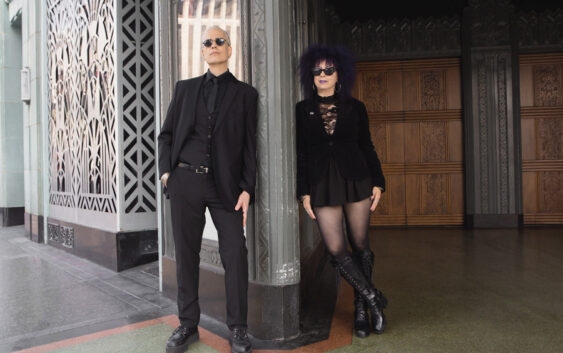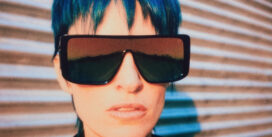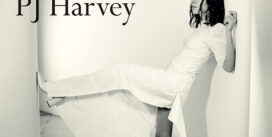I met William Faith on the recent The March Violets European tour, once in Zagreb, Croatia where he also performed with his current project The Bellwether Syndicate and in Brighton, UK where he again played with The March Violets who finished off their tour at Tomorrow’s Ghosts Festival in Whitby. While Faith is mostly associated with Christian Death, Shadow Project, Mephisto Walz and his main project Faith and The Muse, he formed the current project The Bellwether Syndicate together with his partner Sarah Rose in 2011. Both William and Sarah are also a part of the Chicago goth clubbing scene as a DJ duo known as The Pirate Twins.
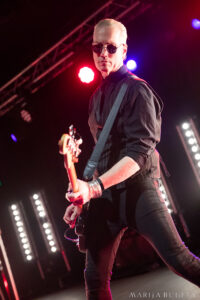 1. I’d like to begin with your earliest music endeavours. When and how did it all start for you?
1. I’d like to begin with your earliest music endeavours. When and how did it all start for you?
William: Like so many people from my generation, I fell in love with KISS. The album Destroyer came out in 1976 (I was 9), and that was my music. I saw them live the following year on my 10th birthday, and as soon as they hit the stage, I knew that that was what I wanted to do with the rest of my life. In that respect, my life has been very easy, as I’ve never wanted anything else. I got a guitar on my 11th birthday, and the rest is history.
2. Why were you mostly drawn to gothic rock music expression and visual identity?
William: When I first encountered it, it wasn’t even called goth; it was all punk rock at the time, and the deathrock tag soon followed. I didn’t even hear the word “goth” until around 1987. My first experience was with the Hell Comes to Your House compilation in 1981, which featured Christian Death, 45 Grave, Super Heroines and some of Social Distortion’s darker moments which, collectively, made quite an impression on me. I was very much enamored with Christian Death, and when Only Theatre of Pain hit the following year, I picked it up immediately. This was immediately followed by T.S.O.L.’s Dance With Me, and those two albums essentially created me. It was a whole new world of style and sound, and I just loved it.
3. You were a member of various bands which all fall under the wide umbrella of gothic music. Which of the different subgenres appeal to you the most and which of the projects is the closest to your heart, if you had to choose?
William: The longer you’re around, the less you care about genres, let alone subgenres. I leave that to other people to categorize. Picking one sound or style is like picking a favorite meal, which doesn’t really work for me, as I enjoy variety. As for which project, of course The Bellwether Syndicate and Faith and the Muse are the most dear, as those are my own bands.
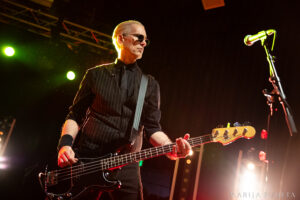 4. You’re probably most known for your project Faith and The Muse which you formed with Monica Richards. The band’s peculiar sound encompasses many genres such as gothic rock, dark wave, ethereal wave and elements of Celtic and other folk music influences. Where did you draw your inspiration from?
4. You’re probably most known for your project Faith and The Muse which you formed with Monica Richards. The band’s peculiar sound encompasses many genres such as gothic rock, dark wave, ethereal wave and elements of Celtic and other folk music influences. Where did you draw your inspiration from?
William: The beauty of that project is that we took inspiration from anywhere and everywhere. We tried to avoid limits on our creativity, and we experimented with anything and everything, which was a true joy.
5. You were also a founding member of Wreckage. Since I’m rather unfamiliar with the project, can you tell us a little bit about it?
William: We were described in a live review in an L.A. paper as “A Damned-influenced band with all the subtlety of a brick through a plate glass window.” I think that assessment was fair.
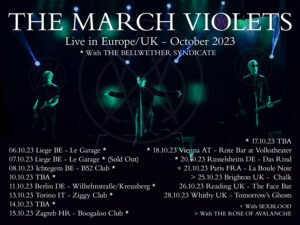 6. You’ve just toured EU and UK with the English gothic legends The March Violets as their bassist. You joined the band in 2015, if I’m not mistaken. How did that collaboration come about?
6. You’ve just toured EU and UK with the English gothic legends The March Violets as their bassist. You joined the band in 2015, if I’m not mistaken. How did that collaboration come about?
William: In 2014, Sarah and I were looking for a headliner for the Convergence festival that we were putting on in Chicago. I remembered seeing The March Violets at WGT the previous year, and so we agreed to reach out and see what was possible. They said they’d love to, but their bass player couldn’t make it. I offered my service to make the gig happen, and they accepted. Next thing I knew, I was in the band.
7. How was the band pleased with the tour and what was the reception like? How was Tomorrow’s Ghosts Festival in Whitby for you?
William: I think Violets fans were very happy to see the band playing out again, especially as everyone thought the band was finished. The reception was great, and Tomorrow’s Ghosts was definitely the high point of the tour for the band.
8. Now to the most recent project The Bellwether Syndicate. Who makes the band’s line up besides your wife Sarah Rose aka Scary Lady Sarah and yourself and how did you come together?
William: The creative core of the band is myself and Sarah, as we write and record all the music. Live, we’ve got Philly Peroxide on keyboards and percussion, my brother Stevyn Grey on drums, who’s been with me since almost the beginning, and Corey Gorey of The Brickbats on guitar/bass. I knew I was going to start a new band when I came to Chicago, and Sarah had always been interested in playing music, so it all followed on from there, really.
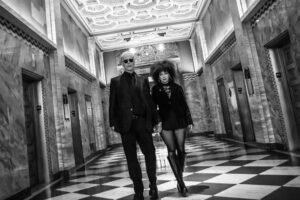 9. The Bellwether Syndicate have released their first full length album Vestige & Vigil this year. There’s a shift to more alternative and post-punk style and you dropped some of the classic goth sound. How do you find yourself in these waters?
9. The Bellwether Syndicate have released their first full length album Vestige & Vigil this year. There’s a shift to more alternative and post-punk style and you dropped some of the classic goth sound. How do you find yourself in these waters?
William: It’s funny, people have such differing perspectives on who we are; some reviews have referred to the album as deathrock, others as classic goth, etc. – and while there are certainly elements of those things, I think it’s much harder to pin down, which is why we go with ‘dark alternative/post-punk/glam noir’ as the descriptors for this album. We find ourselves here by simply letting the songs lead the way, creatively; we follow where the songs want to go, and avoid forcing them into a particular box. We let them be what they want to be, and this is the result.
10. Can you walk us through the writing and recording process?
William: Recording is easy enough, as we work a song up in demo form and then add flesh to the bones bit by bit until it’s finished. Writing is much harder, as there is no set way that we write; inspiration strikes from so many different angles… Sometimes a phrase I hear in passing will trigger a thought, which will suggest a larger idea; other times I’ll play a melody and things just start happening and I can barely keep up; and, in the case of “Golden Age,’ the whole thing came to me in a dream – the lyric for the chorus, the melody, the guitar line for the verses, the beat – the whole thing was just there when I woke up, and I sat up, didn’t say a word to Sarah, and ran downstairs to record it before I lost it. It’s always different – and I wouldn’t have it any other way.
11. What do you focus most in your lyrics?
William: If you were to examine them all, I suspect it’s a fairly even blend of the personal and the political. Some of it is how we see the world, and some of it is how we see ourselves and each other.
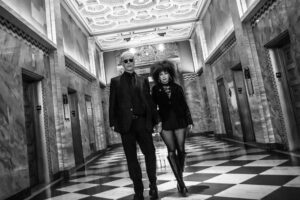 12. You did well on DAA and AAC. Does that come as a surprise to you or were you in a way expecting it? What’s the audience feedback on the album?
12. You did well on DAA and AAC. Does that come as a surprise to you or were you in a way expecting it? What’s the audience feedback on the album?
William: You always hope it will do well, but you never really know for sure. Suffice it to say, we were quite pleased with how well it charted. The feedback thus far has been stellar, but we really want it to reach many more people than it has so far.
13. Some songs are accompanied with a video. To what extent do you find the visual identity of the band important?
William: They are both equally important, in our view. I like bands that look like they sound. Nothing pulls me out of the moment faster than hearing these amazing dark, atmospheric sounds, and then there’s some guy in cargo shorts and a tank top showing up… I feel you need both areas dialed in in order to make a proper impact.
14. You are also a producer. How enjoyable do you find that aspect of your work?
William: It’s a wonderful extension of my creativity. I bring the benefit of objectivity, because it’s not my music, which means I can help other artists get perspective on their own work, which results in better art in the end. I truly love helping other people realize their dreams in the studio, and it is immensely satisfying to see the look on their faces when the way a song sounds meets or exceeds their expectations. That’s always a good moment.
15. How do you find the Chicago underground music scene as opposed to LA or Europe?
William: Every scene is different, and Chicago is quite distinct in the scene landscape, as Sarah has done so much to foster, support and grow the scene here, which is why her club Nocturna is doing the highest attendances in its 35 year history. It’s a very friendly and upbeat scene here, and it is a joy to behold.
16. Would you say that moving to Chicago influenced your music expression in any way?
William: Everything is an influence ultimately, and a move like this definitely had its effects, though I’d be hard pressed to explain precisely what they were/are.
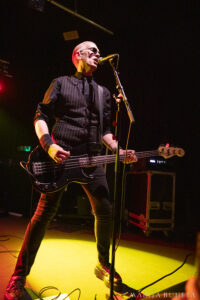 17. In your long music career you were a member of different bands. How open are you to collaboration with other artists if something special piques your interest?
17. In your long music career you were a member of different bands. How open are you to collaboration with other artists if something special piques your interest?
William: The key there is if it piques my interest; I like doing things that are different or unique, as I don’t like repeating myself if at all possible. When something cool comes up, I’m always open to it.
18. Can you recall any special anecdotes from your music career, especially in connection to Christian Death, Shadow Project and Mephisto Walz?
William: There are so many, impossible to enumerate… I will say that the first European tour that Stevyn and I did with Mephisto Walz back in 1992 was kind of the start of it all; we were meant to be in Germany for two weeks, and ended up living there for nearly 6 months… It was a crazy time, but that experience was what led to us joining Shadow Project, Christian Death, which then led to Sex Gang Children, then Faith and the Muse happened – and all of this within a 2 year period… That tour was the catalyst for all that has followed.
19. Throughout the years you also changed your personal style. You went from goth image to somewhat smarter and more casual style. How do you feel about that?
William: My style has varied wildly over the years, but I view all of it as an evolution. For me, it’s about expressing yourself honestly in the moment, wherever you are. If I was to look like I did back in the nineties, yes, I could do it, but it wouldn’t be honest, as that’s not how I feel anymore. That was a great time, but I have enough love and respect for that era to leave it where it is and move on to where I am now. This current expression is where I am right now, and I feel good about it.
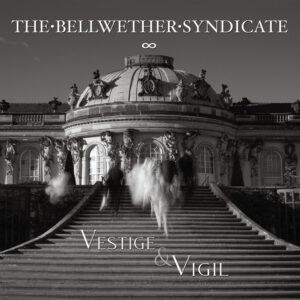 20. Vestige & Vigil is available on CD, vinyl and as a digital album, though CDs and vinyls are sold out. What are your thoughts and feelings on physical vs. digital music formats?
20. Vestige & Vigil is available on CD, vinyl and as a digital album, though CDs and vinyls are sold out. What are your thoughts and feelings on physical vs. digital music formats?
William: It’s really down to what people want. I rarely listen to vinyl, to be honest, as having everything digital is hard to argue with. But as long as people want a certain format, we’ll always try to give it to them.
21. Are there any new live dates for The Bellwether Syndicate soon?
William: There are, but I’m not at liberty to discuss them yet. 😉
22. What’s next for the band?
William: More touring, more recording, ad infinitum.
Thank you for the interview!
The Bellwether Syndicate Bandcamp: here
The Bellwether Syndicate Website: here
The Bellwether Syndicate Facebook: here
Photo credits:
concert pics by Marija Buljeta, The March Violets poster pic by Ryan Swift, The Bellwether Syndicate promo pics by Clovis IV


